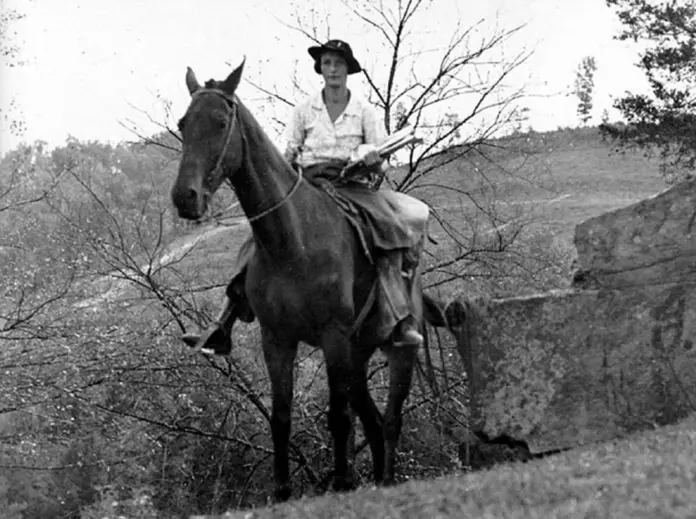
The Pack Horse Library initiative, which sent librarians deep into Appalachia, was one of the New Deal’s most unique plans. The project, as implemented by the Works Progress Administration (WPA), distributed reading material to the people who lived in the craggy, 10,000-square-mile portion of eastern Kentucky. The state already trailed its neighbors in electricity and highways. And during the Depression, food, education and economic opportunity were even scarcer for Appalachians.
Unlike many New Deal projects, the packhorse plan required help from locals. “Libraries” were housed any in facility that would step up, from churches to post offices. Librarians manned these outposts, giving books to carriers who then climbed aboard their mules or horses, panniers loaded with books, and headed into the hills. They took their job as seriously as mail carriers and crossed streams in wintry conditions, feet frozen in the stirrups.
Carriers rode out at least twice a month, with each route covering 100 to 120 miles a week. Nan Milan, who carried books in an eight-mile radius from the Pine Mountain Settlement School, a boarding school for mountain children, joked that the horses she rode had shorter legs on one side than the other so that they wouldn’t slide off of the steep mountain paths. Riders used their own horses or mules-—the Pine Mountain group had a horse named Sunny Jim—or leased them from neighbors. They earned $28 a month—around $495 in modern dollars.
Analysis
In Appalachia during the depression librarians would transport books and other materials to rural families. These women would cross treacherous landscapes and risk their lives to deliver books to children. What type of techniques would these women use to carry items for themselves and extra baggage? These women would also do these trips solo and would have to depend on their wits and will to survive and ultimately triumph over the illiteracy of the Appalachian people. What is interesting in this scenario is that women are in charge of the transportation rather than men. One would think that men would be in charge of this job, because of the physical strain it caused. I find the gender difference fascinating. If men were in charge of this job, would they have transported items differently? Would they have transported more books or fewer books because of size and weight. Additionally, I think it is an interesting scenario to think about people letting a random woman into your home versus a random man. Does gender impact how patients respond to first responders or military?
These women were also working in poor conditions with low pay. This seems to be a common thread with first responders. Did these women feel adequately prepared for the different scenarios they encountered whether it be climate or lack of communication? It seems like many individuals in these types of scenarios have to rely on themselves and their surroundings to achieve their goals safely and efficiently.
Source
Eliza McGraw, “Horse-Riding Librarians Were the Great Depression’s Bookmobiles,” Smithsonian Magazine, June 17, 2017



